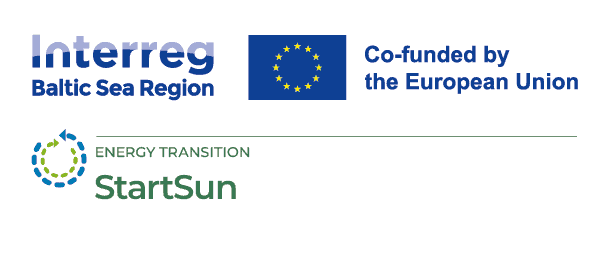
Local Power, Shared Future: Six Baltic Sea Communities Launch Solar Energy Initiatives with StartSun
05 May 2025
Communities across the Baltic Sea region are taking bold steps toward energy independence and sustainability through the StartSun project—Start-Ups for Solar Energy Communities. In just one year, six pilot communities in Latvia, Estonia, Sweden, and Finland have made significant progress in launching local solar energy initiatives, each tailored to their unique needs and contexts.
The project, funded through international collaboration of Interreg BSR, supports communities in creating energy communities—local groups that produce, share, and manage renewable energy collectively. While each pilot is at a different stage of development, they all share a common goal: to empower local actors, reduce reliance on fossil fuels, and foster a sense of community ownership in the green transition.
“StartSun is about more than technology—it’s about people. These first steps show how local communities can take ownership of their energy future while inspiring others to do the same,” emphasized the StartSun project coordinator Sara Spjuth from Länsstyrelsen Östergötland.
Latvia: Growing Interest, Despite Legislative Delays
In Jekabpils and Jelgava, local governments and the Zemgale Regional Energy Agency (ZREA) are leading efforts to establish solar-powered energy communities involving schools, cultural centers, and sports facilities. While national regulations on energy communities are still under development, the initiatives have generated significant interest from other municipalities eager to follow suit.
Estonia: Community-Led Cooperatives in Action
Obinitsa stands out as an early success story. The energy cooperative Energiaühistu Oma Elekter has already been established and is preparing to supply clean solar electricity to a local food processing center. Meanwhile, Kääpa village is developing its cooperative model to support housing renovation and improve local heating systems—demonstrating how grassroots initiatives can drive forward-looking change.
Sweden: Business and Municipality Exploring Joint Energy Ownership
In Åtvidaberg, the municipality is exploring how solar panels on a municipally owned business park could serve as the foundation for an energy community. With a detailed proposal now in development, the pilot is examining how to align community energy with municipal structures and stakeholder needs.
Finland: A Hypothetical Model with Real Potential
In Marttila, the pilot takes a more conceptual approach—exploring administrative and legal models for future energy communities involving municipal housing. The collaboration between Turku University of Applied Sciences, Green Net Finland, and the local municipality lays the groundwork for scalable solutions in rural Finland.
Shared Goals, Shared Challenges
All six pilot projects face challenges—particularly around navigating emerging or incomplete legislation on energy communities. However, the strong local support, innovative thinking, and practical groundwork laid during the first year mark a promising beginning.
“These pilots are proof that people want to take charge of their energy use in a way that is clean, fair, and local,” said Elis Vollmer from the StartSun consortium. “As these communities grow and evolve, they will serve as beacons for others across the Baltic Sea region.”





